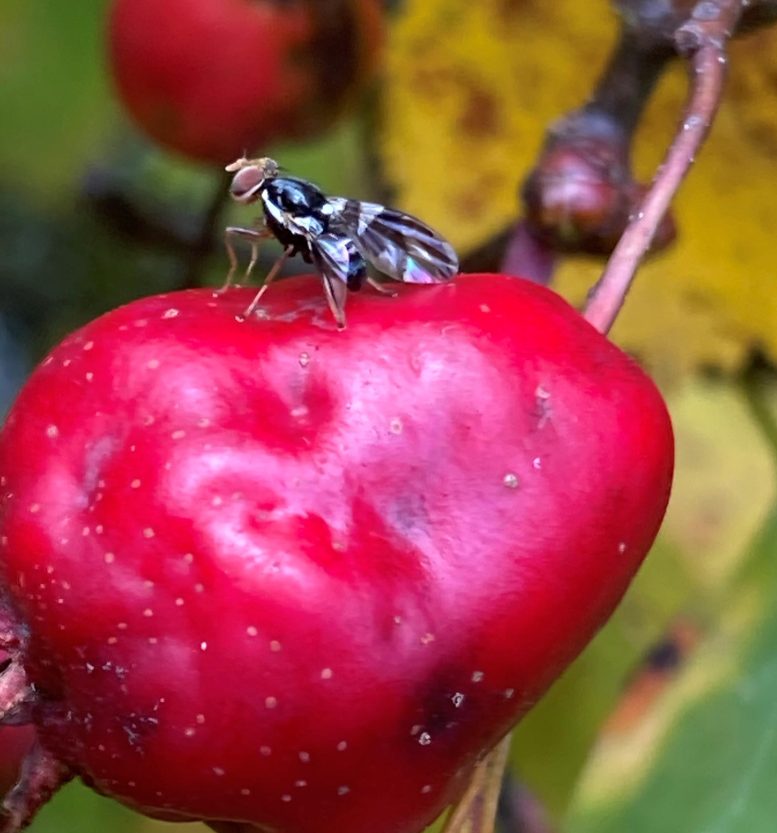
New research delves into the potential repercussions of global warming on ecosystems, and how it could derail the development of new species.
Across the globe, new species constantly emerge as separate groups of organisms branch off and evolve in divergent paths. But what occurs when climate change becomes a variable in this complex equation?
That’s the question Thomas H.Q. Powell, assistant professor of biological sciences at Binghamton University, State University of New York, and his lab seek to answer in a recent paper published in Ecology Letters.
In the 1850s, the apple maggot fly — a major agricultural pest — began to diverge into two populations in the Hudson Valley. One continued to live on the fruit of the region’s native hawthorn trees. The other shifted to a new food source: apple trees, originally introduced to North America by English colonists.

“The entomologist who discovered this actually corresponded with Darwin about it potentially being an example of the origin of species in real-time. It wasn’t until the system was picked back up by researchers in the late 20th century that we found out he was right,” Powell said.
How Temperature Shifts Affect Evolutionary Trajectories
Hawthorns fruit three or four weeks later than apples, resulting in a shift in the two populations’ reproductive schedules. That, in turn, has an impact on several species of parasitic wasps that feed on the maggot fly, demonstrating the delicate balance that undergirds ecosystems.
For their experiment, the researchers reared populations of apple- and hawthorn-based flies and parasitic wasps under conditions matching the seasonal average from the last 10 years of climate data, and then warmer conditions projected 50 to 100 years into the future. The results have important ramifications for insect biodiversity, Powell points out.

Although in the same location, the two fly populations responded to that temperature shift in starkly different ways. The hawthorn-dwellers appeared to have more resilience, possibly owing to more genetic diversity. The lifecycle of the apple flies was thrown out of phase with their host plant, making their survival tenuous — potentially halting the speciation process.
Disruptions in Ecological Balance and Long-Term Risks
However, the life cycles of parasitic wasps weren’t affected by the heat — which could spell dire consequences if they fall out of step with their prey’s lifecycle.
Natural adaptation might be able to restore some balance in disrupted systems long-term, but there are major constraints on rapid evolution. Habitats tend to be smaller and fragmented, for example, limiting the amount of genetic variability that organisms need to respond to evolving pressures.
“It’s not just that climate change is disrupting evolution through the potential breakdown of this classic speciation story, but that the rapid evolution of the flies has a strong bearing on how susceptible they are to climate change,” Powell said. “So, if we’re finding that the effects of these future conditions may be completely different, even for identical flies from the same habitat that have been evolving since just the 1800s, we may see widespread chaos in the ecological timing of insect communities in the coming decades.”
Reference: “Simulated climate warming causes asymmetric responses in insect life-history timing potentially disrupting a classic ecological speciation system” by Alycia C. R. Lackey, Pheobe M. Deneen, Gregory J. Ragland, Jeffrey L. Feder, Daniel A. Hahn and Thomas H. Q. Powell, 20 June 2023, Ecology Letters.
DOI: 10.1111/ele.14268
Never miss a breakthrough: Join the SciTechDaily newsletter.
1 Comment
Light pollution has had a far more devastating effect on the insect populations than climate change. We cannot control the weather or the Sun; but, we have total control over the night time lighting we use. The biggest offenders are Federal, state and municipal governments.
Instead of wasting trillions to prove we cannot control the weather or the Sun, use some of that money to fix our real light pollution problem. Also, as the insect populations decline so do the populations of things that eat the insects.